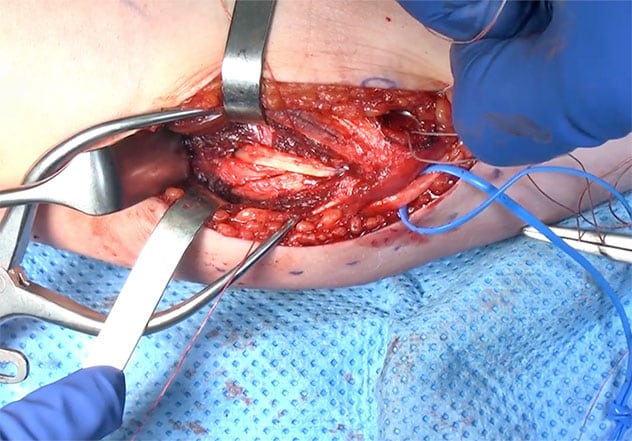Aug. 06, 2021
Sports analytics can provide information about not only an athlete's likely future performance but also that individual's risk of sports injury. Mayo Clinic orthopedic surgeons work closely with professional athletes to discern how to avoid those risks and how to best treat injuries when they occur.
尺侧副韧带重建术

尺侧副韧带重建术
手术照片显示尺侧副韧带重建完成,也称为尺侧副韧带重建术。
One example of this is Mayo Clinic's relationship with the Minnesota Twins. Among other projects, Mayo specialists are working with the major league baseball team on the prevention of injuries of the medial ulnar collateral ligament of the elbow, also known as Tommy John injuries.
"A Tommy John injury is one of the most common and significant injuries in baseball. It often requires surgery with 12 to 18 months until full recovery," says Christopher L. Camp, M.D., a sports medicine orthopedic surgeon at Mayo Clinic in Rochester, Minnesota, and medical director and director of high performance of the Twins. "Everyone involved with a team has a vested interest in identifying individuals who may be at risk of a Tommy John injury before it happens."
The potential benefits of these efforts extend beyond professional sports. "We can eventually use this information to help college, high school and youth athletes," Dr. Camp says. "More Tommy John injuries actually occur in nonprofessional athletes than professionals. Right now, we have a lot more data on professional athletes. But we want to take advantage of that information and apply it to a larger population."
Multidisciplinary and holistic approach
Mayo Clinic's multidisciplinary approach to patient care is also typical of professional athletic organizations. "Pro teams have a lot of high-caliber medical and performance specialists, including athletic trainers, physical and massage therapists, strength conditioning coaches, sports psychologists, and nutritionists, as well as physicians," Dr. Camp says. "The goal of any multidisciplinary approach is to coordinate all these efforts and care not only for injured players but also for healthy players, to help them achieve optimal performance."
That team approach is key to tackling issues such as a Tommy John injury. "The rates of Tommy John injury are rising rapidly. It's a complex problem that will probably have relatively complex solutions," Dr. Camp says. "There's no single cause. We have to take a holistic approach, looking at players' health, at how they perform on the field and what they've done in the off-season."
Risk factors include throwing too many pitches, throwing too hard and throwing with poor mechanics. "Since we're not going to be able to tell players to stop throwing so hard, we have to figure out how to optimize throwing mechanics and throwing volume," Dr. Camp says. "That might mean a pitcher throwing for fewer innings or having more-frequent breaks. It might mean changing the preparation that occurs in the off-season or even focusing on subtle changes in how a player utilizes different pitches."
Mayo Clinic is also applying analytics to the prevention of soft tissue injuries. "Those injuries are actually much more common than Tommy John injuries. The No. 1 injury in professional baseball is a hamstring injury," Dr. Camp says. "Regardless of the type of injury or the level of play, the goal is to use research and analytics appropriately to augment players' health, avoid injury and improve performance."